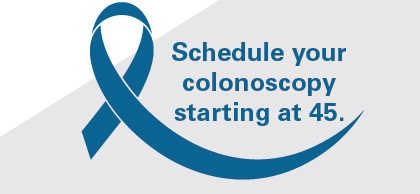Save a life — maybe your own: Know the facts about colon cancer screening
March 18, 2024
This paid piece is sponsored by Avera Health.
Good timing in business can save the day with a client or sale. With colon cancer screening, timing is vital. While colorectal cancer leads to 52,000 deaths each year, it’s among the most treatable cancers when caught early.
“Colon cancer screenings save lives, and we are finding it in younger people,” said Dr. Kevin Post, chief medical officer of Avera Medical Group. “Everyone approaching their 45th birthday should understand that.”
Colorectal cancer is common with more than 150,000 new cases found each year. It’s the second-leading cause of cancer-related deaths, yet among people 50 and younger, it’s the No. 1 cause. Doctors recommend people get screened for it starting at age 45, yet people with a family history are encouraged to start earlier.
When screening guidelines changed from age 50 to 45, patient awareness did too. “We’re seeing more willingness for colonoscopy and a better understanding of preventive care,” Post said. “Our providers appreciate patients who step up. They’re the decision-makers in the care team.”
Avera Medical Group physicians recommend colonoscopy, first and foremost, starting at age 45.
“Colonoscopy is the most sensitive and specific of the screening options for colorectal cancer,” Post said. “Unlike other options, it allows a specialist physician to remove precancerous polyps before they develop into cancer. Of all screening methods available, it’s the least likely to miss a cancer if present.”
For those dreading the exam and the prep, it’s important to remember that preventing colon cancer can save you from cancer treatment, including surgery, chemotherapy and/or radiation therapy.
Yet everyone has seen the ads featuring middle-aged adults who choose an at-home option for colon cancer screening.
While colonoscopy is considered the gold standard, Avera Medical Group recommendations list the at-home stool sample options for people who are unwilling to have a colonoscopy.
They include:
- Multi-target stool DNA or FIT-DNA — known as Cologuard.® It’s shown to be 92 percent effective at finding colon cancer, which is close but not quite as effective as colonoscopy. Colonoscopy is also better at detecting precancerous polyps.
- Fecal immunochemical test, or FIT. It’s 80 percent effective at finding a cancer, yet when compared to FIT-DNA tests, the FIT produces fewer false positive results.
A positive result on either one of these tests would require further testing of a colonoscopy to see if it’s a false positive or if there is a cancerous growth or pre-cancerous polyp that’s causing the positive result.
“While we explain to our patients that colonoscopy is the preferred screening, we know that some people who will never choose to have a colonoscopy are willing to do an at-home test. An at-home screening is better than no screening,” Post said.
Patients who opt for these tests do so at home without any of the preparation.
“Medical tests of all types have pros and cons, but the bottom line is we aim for the most accurate tests possible,” Post said, adding a conversation with your provider is the best way to get the facts.
“You can then tailor your own decision based on your health and your history.”
Over the past 10 years, colon cancer screening rates have improved, yet around 35 percent of South Dakotans are not up to date on their screening “We have to do better because the best screening for colorectal cancer is simple: It’s the one you get,” said Dr. Preston Renshaw, chief medical officer at Avera Health Plans. “There are options if you don’t want colonoscopy.”
For some people, the lack of control that comes with colonoscopy, including its prep and anesthesia, makes that screening scary. “As doctors, we understand,” Renshaw added. “The priority is to get you in and get you screened.”
Renshaw said some health insurance plans will cover colonoscopy costs for patients who get a positive result on a stool-sample screening such as Cologuard.
Whenever there are possible signs of colorectal cancer, it’s important to see your provider. Symptoms include:
- Bowel habit changes like diarrhea, constipation or narrowing of stool that continues for days.
- Bloating or a feeling like you need a bowel movement that isn’t relieved by going to the bathroom.
- Pain, tenderness or cramping in the lower abdomen.
- Rectal bleeding, blood in the stool or dark stools.
- Unintended weight loss and fatigue.
You can help reduce your cancer risk by getting more exercise and eating a better diet, including less red meat, more whole grains and more fruits and vegetables. Moderate your alcohol use. Leave processed products on the shelf.
“Every small step adds up to reduce risk,” Renshaw said. “Yet colon cancer screening is a big step in cancer prevention that you don’t want to skip.”
Learn more at Avera.org/Colon.






